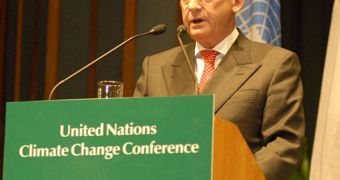The United Nations released a 53-page recommendation report on Wednesday, saying that the world was not yet “standing still” as far as a consensus on climate change was concerned. At last December's summit in the Polish city of Poznan, the divide between the developed and the underdeveloped world widened. While the former asked third-world countries and developing nations to do more to curb their greenhouse gas emissions, the latter requested nations such as the US, the UK, Germany, Australia and Japan to help with the fight against a phenomenon they produced, by giving as much as two percent of their GDP.
Despite the fact that promises for the Copenhagen summit multiply, experts are reluctant in accepting the idea that all of the 195+ nations that will be attending will sort out their issues before this December's meeting. The head of the UN Climate Change Secretariat, Yvo de Boer, told that nations needed to get past their petty squabbles and political rivalries, in order to come up with a replacement agreement for the Kyoto Protocol, signed in 1997, but which expires in 2012.
By that time, the world needs to have another agreement in place, which would ensure that efforts started in the battle against global warming and climate change will continue. Most nations in the world call for a reduction of greenhouse gas emissions to 1990 levels by 2020, but there are a number of states that refuse to engage in writing in such promises, preferring to remain outside such agreements. The good part, however, is that the US, China and India – the main polluters of the world – agreed to sit down in Copenhagen and discuss the issues at hand. China stated it would join the UN initiative as long as its right to fair economic growth was not hindered by the environmental effort.
The main problem that governments around the world need to put aside is that of the global financial crisis, which has already determined a lot of governments, including that of Australia, to back down on the promises they made to protect the environment. Officials in the EU want to reduce its GHG emission levels by 15 to 30 percent below the estimated growth levels for this time-frame. The US, under Obama, wants a 14 percent cut when compared with 2007 levels by 2020, Reuters reports.

 14 DAY TRIAL //
14 DAY TRIAL //